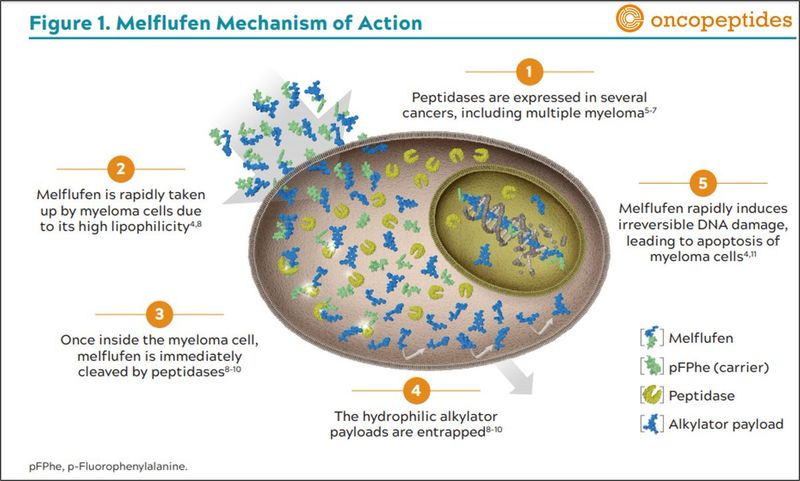Oncopeptides Presents Updated Efficacy and Safety Data from Melflufen Pivotal Phase 2 HORIZON Study in Patients With RRMM at ASH Annual Meeting 2019

STOCKHOLM, Dec. 7, 2019 /PRNewswire/ -- Oncopeptides AB (Nasdaq Stockholm: ONCO) will today present follow-up data from the pivotal Phase 2 HORIZON (OP-106) study at the ASH Annual Meeting 2019. Melflufen showed an overall response rate (ORR) of 29% and clinical benefit rate (CBR) of 37% in patients with late-stage relapsed/refractory multiple myeloma (RRMM). The safety profile remained consistent with prior reports from the HORIZON study. These data reinforce Oncopeptides' view that melflufen can play a role in the treatment of patients with RRMM and the Company plans to submit a New Drug Application (NDA) to the FDA in the first half of 2020.
Overall Conclusions - HORIZON Poster Presentation
- Patients in the HORIZON study had a median of five prior lines of therapy, 71% of patients were triple-class refractory, 97% were refractory to the last line of treatment, and 32% suffered from extramedullary disease (EMD).
- In the ITT population (n=125), the overall response rate (ORR) was 29% and the clinical benefit rate (CBR) was 37%.
- In patients with triple-class refractory disease (n=97), the ORR was 24% with a median progression-free survival (PFS) of 4.0 months, a median duration of response (DOR) of 7.5 months and a median overall survival (OS) of 11.3 months.
- In patients with EMD (n=42), the ORR was 24% with a median PFS of 3.0 months, a median DOR of 5.1 months and a median OS of 8.1 months.
- Grade 3 and 4 Adverse Events (AE) were primarily hematologic and the incidence of non-hematologic AEs was low.
Jakob Lindberg, CEO comments:
"These data from our pivotal HORIZON study confirm that melflufen is efficacious in this late stage patient population where currently available treatment options may not be sufficient. In particular, the ORR of 24% with a DOR or 7.5 months in patients with triple-class refractory disease is impressive. The responses seen in patients with EMD are also very encouraging as no other available single agent has shown similar efficacy in this very difficult-to-treat patient population. Taken together with a relatively clean safety profile from a patient perspective, these data lead us to believe that melflufen has the potential to play an important role in the treatment of patients with relapsed/refractory multiple myeloma. Consultations with regulatory bodies are ongoing and we are planning to submit an NDA in the first half of 2020. This represents a slight change compared to previously communicated timelines after regulatory interactions have resulted in minor changes to the planned submission package."
The posters are available on the company webpage under:
www.oncopeptides.com / Investor Relations / Presentations / ASH 2019
The information in the press release is information that Oncopeptides is obliged to make public pursuant to the EU Market Abuse Regulation. The information was submitted for publication, through the agency of the contact person above, on December 7, 2019 at 15.00 (CET).
About the OP-106 HORIZON study
Patient recruitment in the pivotal Phase 2 HORIZON study is completed with 157 patients enrolled. The efficacy population (n=125) reflects patients dosed on or before May 15, 2019 with additional follow-up of 20 weeks until October 1, 2019 at the time for the data cutoff. The safety population (N=154) reflects patients dosed on or before the data cutoff on October 1, 2019. The patients in the study are refractory to pomalidomide and/or daratumumab after failing on immunomodulatory drugs (IMiDs) and proteasome inhibitors (PIs). The HORIZON study population includes subgroups of patients who were triple-class refractory and/or had relapsing EMD and/or had cytogenetic high-risk features.
About Melflufen
Melflufen is a novel peptide-drug conjugate that rapidly delivers a cytotoxic payload into tumor cells. Melflufen is rapidly taken up by myeloma cells due to its high lipophilicity and is immediately cleaved by peptidases to deliver an entrapped hydrophilic alkylator payload. Peptidases play a key role in protein homeostasis and feature in cellular processes such as cell-cycle progression and programmed cell death. In vitro, melflufen is 50-fold more potent in myeloma cells than the alkylator payload itself due to the increased intracellular alkylator concentration. Melflufen displays cytotoxic activity against myeloma cell lines resistant to other treatments, including alkylators, and has also demonstrated inhibition of DNA repair induction and angiogenesis in preclinical studies. (Article from : www.drugs.com)

